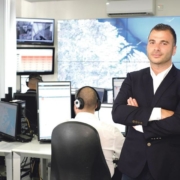‘eCabs mission is to change Malta’s mobility culture’
eCabs was set up to provide a feasible personal transportation alternative to people and kick-start a change in mobility culture and mentality, CEO Matthew Bezzina says.
In its 10th year of operations, eCabs today boasts impressive growth, making the company one of the leading transport solutions providers in Malta with aspirations to go international. eCabs CEO Matthew Bezzina speaks to The Sunday Times of Malta about his ongoing quest for higher standards in service provision and how technology has enabled the business to evolve.
“Today, 10 years down the line, we look back with pride and satisfaction. But we also look forward to the next revolution we want to trigger.”
He points out that like many other ventures, there were many challenges along the way. If he had to pin down one critical success factor that is at the heart of the company’s growth results, it would be the nexus between vision, commercial strategy and the implementation of a business plan.
“Coming from the tightly-knit logistics environment, for us, planning is a religion that we practise at all levels of our company: from the boardroom to our facilities management function.
“Equally important was our reinvestment culture. We were never after enjoying the fruits of our labour by reaping them but by reinvesting every single cent back into the business to make it stronger, more resilient and future-ready.”
Delivering change in mobility culture by bringing people together
Today, eCabs’ fleet runs into hundreds of cabs and it is by far the largest such operation in Malta, employing over 700 individuals across all departments.
“Our logistics centre team runs the operation with clinical precision, based on a technology platform developed and supported by our brilliant tech team. The latter provides both consumer apps for booking and driver apps for service fulfilment by our highly trained and competent drivers. These are all supported by our call centre operators. This is the beauty of eCabs: the ability to deliver change in mobility by bringing people together,” he says.
Mr Bezzina refers to the company’s control centre as the heart of eCabs’ operational setup, a melting pot of all the activity driving eCabs.
“Our logistics and control centre, which operates on a 24/7 basis and is run at exceptional efficiency levels, optimises service levels and our operational capacity. At any point in time, 20 people – who handle all the incoming bookings and requests that come through our website, through e-mail, phone, social media or our mobile app – man the centre. The control centre gives us the visibility in real time of all our fleet, and the IT platform enables our operators and drivers by devising the best route possible for them.”
Smart technology
Perhaps one aspect that defines eCabs is its use of ‘smart technology’. Mr Bezzina stresses that from day one, eCabs has always been run as a technology company that seeks to enable passenger transport solutions to address congestion challenges in Malta.
“We intend exposing our achievements on the international stage to tap into the scale of markets beyond our shores. “It is true that we move people. But what differentiates us from other operators is that in our case, IT lies at the heart of our vision. It can be considered to be the nervous system of our operation.
“As a matter of fact, our intellectual property has grown to the extent that we are now spinning off our ICT operations into a dedicated company in order to enable it to provide services to third parties, locally and internationally. With this in mind, when we describe our technology as ‘smart’, we mean that the technology is an intelligent one that is constantly aggregating the mobility data that we have been accumulating over the years to improve the services that we offer.”
A highly human resources-intensive environment
eCabs has grown to the extent that, like many other companies, it has felt the need to hire workers of other nationalities. In fact, the real challenge is not to retain these workers. But to find workers who are committed enough to enter this sector.
“Today, the talk of ‘foreign workers’ needs to stop. There are no such thing as ‘foreign’ workers. There are workers who decide to make Malta their home, they decide to commit to working and they work. At eCabs, we have an encouraging number of non-Maltese workers with us who receive continuous training, assisted by our technology and communications infrastructure. As we speak, we are striving to widen the catchment of our workforce to attract talent from all walks of life with the only underlying pre-requisites being the willingness to learn and the unquestionable commitment to passenger safety and service delivery.”
Human resources was always the biggest challenge for eCabs, especially when the company was starting up. The company acknowledges that it operates in a highly human resources-intensive environment, and the limited pool of people willing to work in a disciplined and structured environment is somewhat challenging, albeit not impossible.
“But even here we changed culture and we’ve managed to the extent that today, even women are applying to join us as drivers. Today, in fact, one of my most cherished statistics is that 20 per cent of our drivers are women. We not only believe in equal opportunity, we enable it in practice.”
A change in mobility culture and mentality
Another challenge is the fact that eCabs operates in an environment where the roads are becoming busier and busier. Mr Bezzina believes that the current infrastructural works may provide a temporary relief, especially for congested hotspots. However, this is not the optimal long-term solution in which the major investment should be made.
“The fact of the matter is that our roads are not able to take on the quantum of vehicles being put on them. Any long-term strategy should be anchored around changing culture, not merely burdening further the infrastructure to accommodate the accumulation of further congestion. And when you change the mind-set of people, you can achieve greater things.
“This is what we have been doing here at eCabs – promoting the reality that a change in culture and mentality is indeed possible. With the use of technology, we are making it increasingly easy and cheaper for people to be encouraged to leave their car and start using cabs more. It is not a change that will happen overnight, but it will take years. But we’re managing because if we weren’t, we would have been out of business a long time ago. If we can do it, so do the rest.”
Looking to the future
Looking to the future, Mr Bezzina sees eCabs’ commercial vision as second to none, and said that a lot will be happening over the coming months to reinvent the industry.
“I believe that our proposition, based on best practice and operated through an integrated IT infrastructure that we have developed in-house and built and rebuilt over these past 10 years, is a unique one. The huge amount of movement data we collate every day contributes to a constant improvement of the service at all levels, particularly for route optimisation.”
In the coming months the company will be engaged on initiatives at all levels. From deploying new features on its consumer app, to the provision of new transport products, up to the internationalisation of its business model.
“As eCabs is growing into one of the largest corporates on this island, we intend exposing our achievements on the international stage to tap into the scale of markets beyond our shores,” Mr Bezzina says.
In the press:



